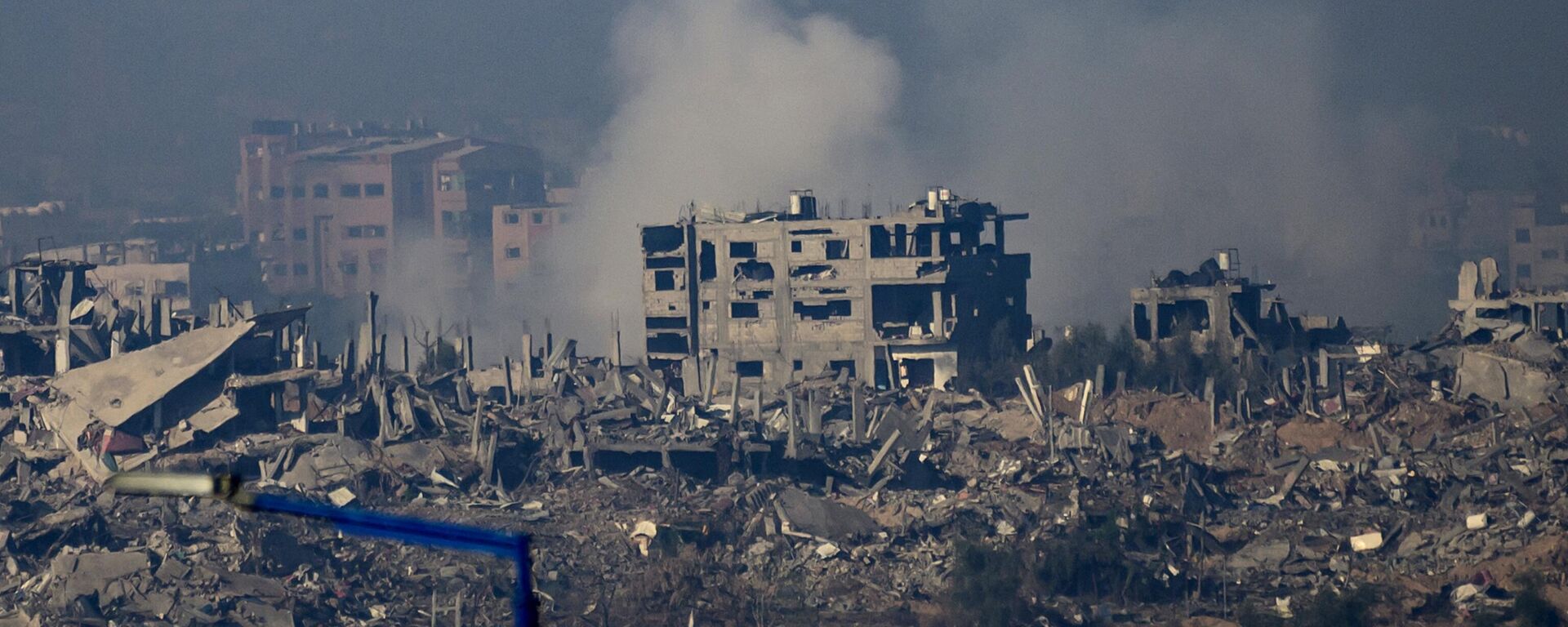Israeli 'M' Size Leaders Can't Resolve 'XXL' Size Palestine-Israel Problem: Ex-PM
18:53 GMT 07.12.2023 (Updated: 10:28 GMT 30.01.2024)

© Sputnik / Sergey Guneev
Subscribe
The unprecedented explosion of violence in the three-quarters-of-a-century old Palestinian-Israeli conflict in October prompted renewed calls by governments around the world to facilitate the creation of a full-fledged Palestinian state along the 1967 borders. The Netanyahu government has rejected these calls and pledged “total victory” in Gaza.
Prime Minister Netanyahu and his government are not up to the task of bringing a lasting peace in the Palestinian-Israeli crisis, and new leadership on both sides will be necessary to do so, former Israeli Prime Minister Ehud Barak has said.
“Before October 7, a good half of Israelis believed a two-state solution was possible. Now, the proportion would be smaller due to the impact of feelings of rage, humiliation and the desire for revenge. But I remain optimistic about the future. I am old enough to remember more difficult times for Israel’s existence,” Barak said in an interview with French media published Thursday.
“People of my generation lived through a series of bitter wars with Egypt and Jordan. But we have now enjoyed stable peace with them for forty-five years. Israelis haven no idea how strong the security cooperation is with these countries. I’m confident that when the time comes the leadership both parties [the Palestinians and the Israelis, ed.] need will materialize. But at the moment, we do not have leaders of a caliber fit for purpose. The challenge is size ‘XXL’ and our leaders are size ‘M’,” the 81 veteran former special forces officer-turned former Israeli Labour Party politician said.
Characterizing the October 7 Hamas attacks into southern Israel as “a major intelligence and tactical failure” comparable to the 1973 Yom Kippur War, in which he fought, Barak stressed that “Netanyahu himself has said publicly that he knew of Hamas’ intentions to attack the kibbutzim and take hostages.”
“He is clearly responsible for the strategy formulated by his finance minister, Bezalel Smotrich, according to which ‘Hamas is an asset’. Over the past five decades, Natanyahu’s policies have clearly aimed to strengthen Hamas and weaken the Palestinian Authority…Netanyahu had an interest in Hamas remaining alive and active. It was easy to say that we couldn’t reach a solution because the Palestinian Authority was too weak, that it didn’t even control half of its own population and that we couldn’t negotiate with Hamas. This allowed any political solution to be blocked. Netanyahu’s strategy was illusory, it collapsed. There was also the idea that we could open a breach with the Saudis, make peace with the rest of the Muslim World while ignoring the Palestinians. This idea also collapsed,” Barak said.
Calling Netanyahu a “statesman of a special kind” who presents himself as “Mr. Security” but whose policies have only made Israel less safe, Barak suggested that his “unholy alliance” with “messianic racist parties of Ben Gvir and Smotrich” have made things worse, turning him into a “prisoner” of his own coalition.
“If he considered a two-state solution, it would bring down his government,” Barak said. Consequently, “Netanyahu may have an interest in a long war,” because “in a short war, he would be ousted from power.”
As far as Tel Aviv’s pledge to “destroy Hamas” is concerned, Barak said many “practical” questions remain. “We cannot rely on airstrikes alone. We need thousands of infantrymen on the ground, for a long time. It might take a year. Certainly it is impossible to eradicate an ideology, to remove wishes and dreams from the heads of individuals. But with enough force and time, rockets, laboratories, training sites and communications facilities, tunnel command posts can be destroyed,” the retired statesman believes.
As for Gaza’s fate, it is not in Israel’s interest to occupy the Strip for “the next ten or twenty years,” according to Barak, which such an idea constituting the “worst solution.”
“The idea is to set up a multinational force for a very limited period. After three to nine months, when the military objectives are reached, a revised, strengthened and revitalized Palestinian Authority will be able to extend its control over Gaza. The international force may stay behind for a short period beyond three-nine months to ensure that it does so. Some say it won’t work, but you can’t say that in advance. It is a fact that the Palestinian Authority is weak, and as you know, it takes Gazans to govern Gazans. However, most of them are affiliated with Hamas.”
Barak believes Israel is “constrained” in its actions by several factors, including the remaining hostages, the ever-present danger of the conflict spreading across the region, and time. “We know from experience that support from the rest of the world is quickly eroding,” the politician said. “We have already lost legitimacy among Western public opinion. We are losing the support of governments one by one – look, for example at the nuances of Emmanuel Macron’s speeches.”
Barak served as Israel’s prime minister between July 1999 and March 2001, and took part in the 2000 Camp David Peace Summit alongside Palestinian President Yasser Arafat hosted by President Clinton. His negotiating position included 95 percent of Palestine’s internationally-recognized claims to the West Bank, and all of the Gaza Strip, plus areas of East Jerusalem containing non-Jewish populations. The proposal recommended resolving the Palestinian right of return issue through cash reparations. Arafat ultimately rejected the proposal.
Talks continued in January 2001 after Palestinian officials expressed interest in a territorial swap agreement of Israeli-occupied settler areas in the West Bank in exchange for Israeli territories elsewhere. The talks collapsed after Likud candidate Ariel Sharon’s election in February 2001, culminating in the escalation of the Second Palestinian Intifada.





